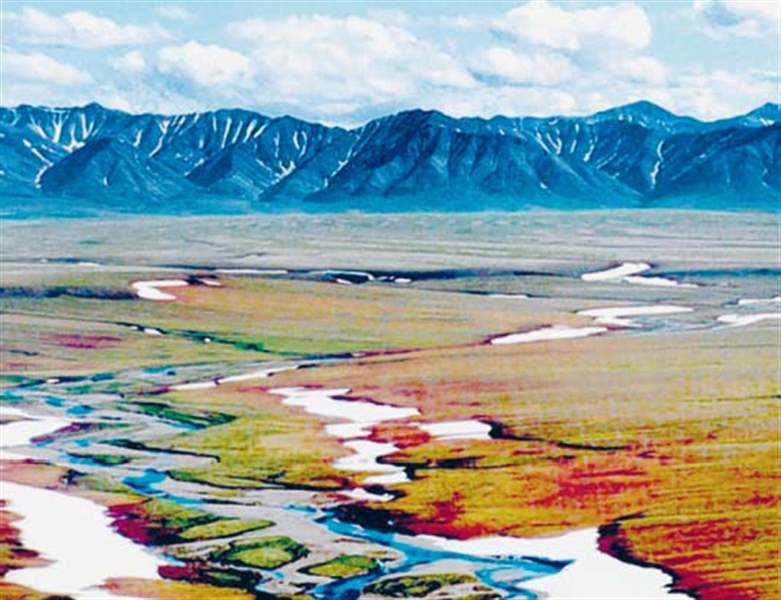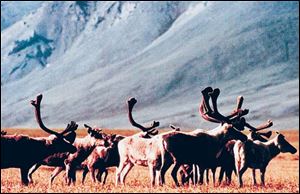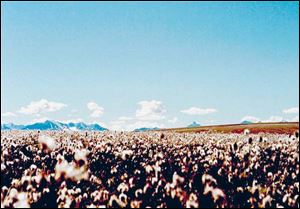
Natives support Republican goal of drilling for oil
7/20/2008
Estimates indicate that 10.6 billion barrels of oil lie beneath the Arctic National Wildlife Refuge in Alaska, and as much as 750,000 barrels could be pumped from there daily.

Estimates indicate that 10.6 billion barrels of oil lie beneath the Arctic National Wildlife Refuge in Alaska, and as much as 750,000 barrels could be pumped from there daily.
When 10 Republican congressmen 9 of them freshmen facing a crucial re-election in November set boots on tundra today in Alaska, they ll meet with native villagers who will likely agree with them on the need to drill for oil in the Arctic National Wildlife Refuge.
But political opponents and environmentalists say the GOP journey to one of America s northernmost outposts is a junket and a public relations stunt.
The Republicans, including Reps. Bob Latta of Bowling Green and Jim Jordan of Urbana, Ohio, say the trip is a fact-finding mission. But they also admit it s an effort to generate public support for expanding America s domestic supply of oil by drilling in the known reserves of ANWR.
Several residents of the small native village of Kaktovik who were contacted by The Blade Friday by telephone said the majority of the residents lean in favor of drilling for oil because of the economic benefit it would bring their community.
More people support it here than don t, said Adam Linn, administrator for the Kaktovik Inupiat Corporation.
We don t care for environmentalists. We ve got our own criteria. As long as the animals are not harmed and we can still hunt them, that s fine, Mr. Linn said.
A gallon of milk costs $9 here.
That s how high the cost of living is. If they open ANWR, it ll cut down on our prices.
The trip, which began Friday in Washington and ends tomorrow night, takes the GOP House delegation to Colorado, Fairbanks, the oil town of Deadhorse at Prudhoe Bay, and the native village of Kaktovik.

The Gwich in people, native to ANWR, oppose drilling for oil on the reserve and consider the coastal plain a sacred place where the caribou birth and nurse their young.
On Friday, the American Energy Tour visited the National Renewable Energy Laboratory in Golden, Colo., where the group viewed projects including plug-in electric, solar, and hydrogen-fueled vehicles and a wind-to-hydrogen project.
The trip is being funded and facilitated by the Bush Administration. President Bush hascalled for drilling in the coastal plain of the 19-million-acre wildlife refuge north of the Arctic Circle.
The best estimates of the volume of oil beneath ANWR are about 10.6 billion barrels a lot of oil, but a fraction of the total known reserves in the world of 1.2 trillion barrels.
Some estimate that, if fully developed, ANWR could produce 750,000 barrels of oil daily compared with current national daily consumption of 21 million barrels of oil.

It s beautiful here, a resident says of ANWR. We ve got fi elds of flowers right now.
Everything helps, and 10 billion barrels is not an insignificant amount, said Michael Steel, press secretary for Rep. John Boehner (R., Ohio), the House minority leader who organized the trip.
A political issue
Recent polls show that the American public supports drilling in ANWR, and Mr. Steel predicted most Democrats in Congress would vote for it as well.
It is the House leadership that is avoiding letting that happen, he said.
Critics of the congressional trip abound.
House Speaker Nancy Pelosi (D., Calif.) issued a statement linking the House Republicans with the failed policies of President Bush. She said oil companies already have leases to drill on 68 million acres on land and off shore that they have not exploited.
Opening new lands to drilling won t save Americans one penny for at least a decade, Mrs. Pelosi said, again calling on Republicans to support her call to release oil in the Strategic Petroleum Reserve.
U.S. Rep. Marcy Kaptur (D., Toledo) called the trip a junket and a public relations stunt at taxpayers expense in an election year.
The Boehner-led delegation wants to send pretty pictures back home when the picture isn t pretty at all, Miss Kaptur said in a prepared statement, adding that families are being stretched to the limit while oil companies revel in historic high profits.
What s next on their agenda for Big Oil, drilling in Lake Erie? Miss Kaptur asked.
Mr. Steel said he s heard no calls for sinking oil wells in the Great Lakes.
An up-close view
Residents of Kaktovik, the small village at the northern tip of the Arctic National Wildlife Refuge, support drilling by 78 percent, according to a survey done several years ago.
Marie Kaveolook, a part-time school aide, said the community is united in opposing off-shore drilling from ANWR.
But she said the technology of accessing and transporting oil is improving.
It would help a lot because the cost of living here is very, very, very, very expensive, Ms. Kaveolook said, quoting the price of a round-trip to Fairbanks at more than $700.
There are no roads leading out of Kaktovik.
She said the village has seen numerous fact-finding delegations come and go.
They come every year. They just ask the same old questions. It seems like to me it s the same old thing every year, Ms. Kaveolook said. They should have done this 20 years ago.
A town resident who opposes drilling is Merylin Traynor, who moved to Kaktovik 14 years ago and manages the Waldo Arms hotel.
I would say [opinion is split] 50-50. I think some of our younger people want to keep it as it is, so they can go hunting and fishing as they ve learned from childhood, she said.
She admitted the development would be an economic benefit for the people in Kaktovik.
The locals here could have jobs, Ms. Traynor said. She said the perception that the coastal plain is a desolate wasteland might be understandable for people who are used to seeing trees.
It s beautiful here. We ve got fields of flowers right now. The birds nest here. We ve got polar bears, she said.
A sacred place
The native Gwich in people who live about 150 miles south, also in the refuge, are said to oppose drilling.
Emilie Surrusco, a communications coordinator for the Alaska Wilderness League, based in Washington, said the Gwich in consider the Coastal Plain a sacred place where the caribou birth and nurse their young.
The Gwich in people have been depending on the porcupine caribou herd for thousands of years, and without the costal plain they wouldn t survive. It s a huge issue to them, Ms. Surrusco said.
She said the 2,000 acres cited by proponents of drilling as the total size of the drilling installations don t explain that it would be a total of 2,000 acres made up of widely separated drilling facilities connected by roads.
They d have to connect the various wells that are spread out across the coastal plain. There s nothing there. It s really the biological heart of the refuge. There s a lot of wildlife that live on the coastal plain, Ms. Surrusco said.
Nature and development
Mr. Linn said the Kaktovik village owns 90,000 acres in ANWR and expects to reap lease payments for the use of the land, as well as benefit economically.
He disputed Ms. Surrusco s predictions about the porcupine caribou herd, saying the Prudhoe Bay drilling to the west has not harmed the caribou.
They say the caribou die off. But those guys live hundreds of miles away. We ve seen it in Prudhoe. There s caribou right there in the oilfields, Mr. Linn said.
A written position of the Kaktovik community that it says has been held for 20 years states: We would support oil exploration and development of the coastal plain provided we are given the authority and the resources to ensure that it is done properly and safely. Without the necessary provisions to ensure this protection, we would not.
Contact Tom Troy at:tomtroy@theblade.comor 419-724-6058.